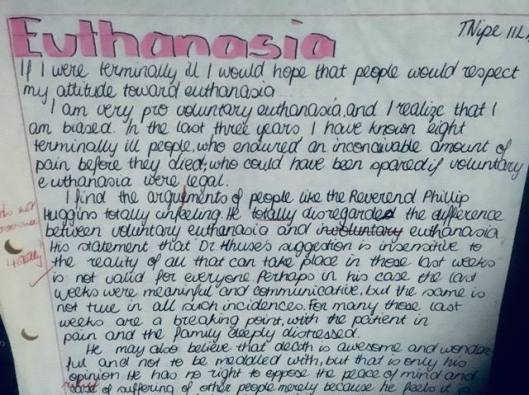Tags
In seventeen days it will be a year since the Andrews government passed Australia’s first state* legalising Voluntary Assisted Dying for adults who are competent, suffering, and have a life expectancy of six months or less (twelve months or less for those with neurodegenerative conditions). It comes into effect mid-June of next year – unless the state election in twelve days changes Victoria’s MP composition, as a number of parties (including the Liberal party and the Shooters and Fishers) want to overturn it before the system and processed have even been completed.
Last year I put my money where my mouth is as a project officer for the Victorian branch of the Australian Nursing and Midwifery Federation, working to get the legislation through; this month I’m working to keep the legislation intact by campaigning as a candidate for the Voluntary Euthanasia Party in the Eastern Metro region.

The Voluntary Euthanasia Party has four, interrelated national policies: to campaign for the legal right for competent, dying people to choose how and when they will die, without fear or pain; to improve the status of Advanced Care Directives so they are binding, educate health staff about their use, and have completed ACDs available on a statewide database for ready access by health practitioners when required; to support improved research and funding for quality palliative care; and improve access to medical marijuana.
As everyone who knows me, follows this blog, or follows me on Twitter knows, I am passionate about a number of things, primarily around health, education, justice, and equity. These policies are all consistent with mine, and my ethical position as a casuist is also consistent with the VEP’s platform of determining positions on other matters as they arrive.

My position on this has been consistent since high school, informed by almost thirty years as a nurse in Victoria’s acute public sector, and honed by my three post-graduate qualifications in health care ethics.
I firmly believe that Voluntary Assisted Dying should be an option only after specialist medical review, and if palliative care interventions have proven inadequate. To ensure this is not just a pleasant theory, I strongly support and have long advocated for increased funding and support for palliative care services, particularly for non-oncological conditions (like end-stage organ failure), and in regional and remote areas.
To listen to me speak about the VAD legislation, listen to this podcast of my address at the Melbourne Unitarian Peace Memorial Church last month: http://melbourneunitarian.org.au/index.php/mp3-service-podcasts/549-tara-nipe-registered-nurse-voluntary-assisted-dying
Over the next week and a half I’ll discuss my positions on alcohol and other drugs, post-secondary education, energy and the environment, the health care system (with additional entries covering the Indigenous health gap, mental health, and sexual health), social support systems, taxation, and workers rights.
* Australia’s first legislation, enacted in 1996 and overturned in 1997, was in the Northern Territory


